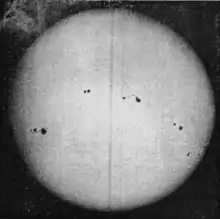Solar cycle 14
Solar cycle 14 was the fourteenth solar cycle since 1755, when extensive recording of solar sunspot activity began.[1][2] The solar cycle lasted 11.5 years, beginning in January 1902 and ending in July 1913. The maximum smoothed sunspot number (SIDC formula) observed during the solar cycle was 107.1, in February 1906 (the lowest since the Dalton Minimum), and the starting minimum was 4.5.[3] During the minimum transit from solar cycle 14 to 15, there were a total of 1023 days with no sunspots (the second highest recorded of any cycle to date).[4][5][6]
| Solar cycle 14 | |
|---|---|
 The Sun, with some sunspots visible, during solar cycle 14 (1904). | |
| Sunspot data | |
| Start date | January 1902 |
| End date | July 1913 |
| Duration (years) | 11.5 |
| Max count | 107.1 |
| Max count month | February 1906 |
| Min count | 4.5 |
| Spotless days | 1023 |
| Cycle chronology | |
| Previous cycle | Solar cycle 13 (1890–1902) |
| Next cycle | Solar cycle 15 (1913–1923) |

Solar prominences during solar cycle 14 (21 August 1909).
Geomagnetic storms in November 1903, March 1905, and September 1909 affected telegraph lines.[7]
See also
References
- Kane, R.P. (2002), "Some Implications Using the Group Sunspot Number Reconstruction", Solar Physics, 205 (2): 383–401, Bibcode:2002SoPh..205..383K, doi:10.1023/A:1014296529097
- "The Sun: Did You Say the Sun Has Spots?". Space Today Online. Retrieved 12 August 2010.
- SIDC Monthly Smoothed Sunspot Number. ""
- Spotless Days. ""
- Dr. Tony Phillips (11 July 2008). "What's Wrong with the Sun? (Nothing)". NASA. Archived from the original on 14 July 2008.
- Solaemon's Spotless Days Page. ""
- Storms, Solar (28 July 2017). "Space Weather Newspaper Archives". www.solarstorms.org.
This article is issued from Wikipedia. The text is licensed under Creative Commons - Attribution - Sharealike. Additional terms may apply for the media files.
